Trump bill to limit nursing loans
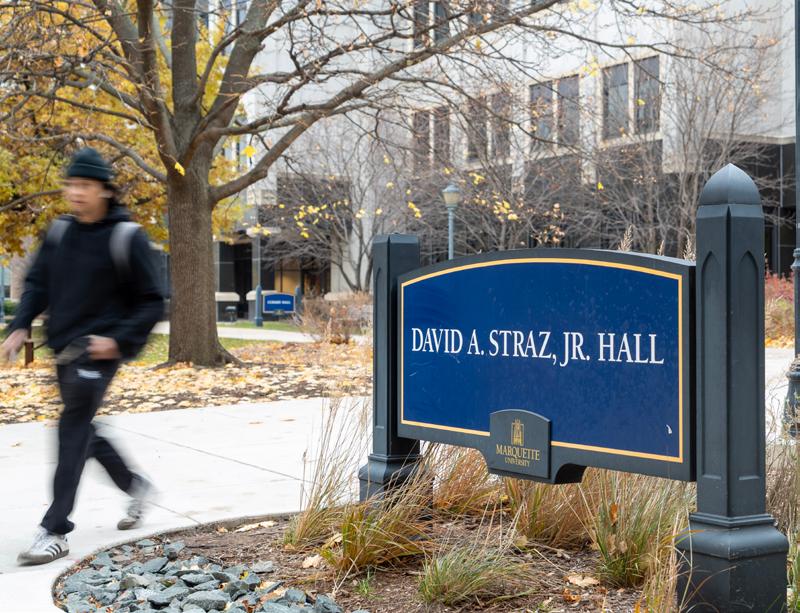
By Lilly Peacock lilly.peacock@marquette.edu
Nursing, one of Marquette University’s largest academic programs, is no longer defined as a “professional degree” after the One Big Beautiful Bill Act established new limits on student loans for postsecondary education.
Beginning July 2026,
annual loans will be capped at $50,000 for graduate students in professional studies. But for graduate students in programs that aren’t considered professional, loans only cover up to $20,500 a year, with a $100,000 total limit.
Physical therapy, education and social work are among those not included in the new, narrowed definition of professional degrees, along with nursing.
In 2024, Marquette opened David A. Straz Jr. Hall, the new home for the College of
Nursing. Dean Jill Guttormson said at the time that the building was designed with nursing students’ self-care in mind.
On Nov. 6, the Department of Education concluded negotiations on all federal student loan-related changes within the OBBB, including what is defined as a professional degree.
The DOE emphasized that the federal definition has not been updated to exclude nursing and other programs, but rather that it was never considered a
“professional degree” in the first place. This is based on a 1965 law that defined the following as professional:
- Pharmacy - Dentistry
- Veterinary Medicine - Chiropractic - Law
Medicine - Optometry - Osteopathic Medicine - Podiatry
- Theology
In a letter released by the American Council on Education, President Ted
MU installs sleep pods for students
Some of those midnight hours may cut into full nights of sleep, leaving students falling behind on rest.
their head.
By Lance Schulteis lance.schulteis@marquette.edu
As the end of the semester nears, Marquette University students are preparing for late nights of schoolwork and studying.

But rather than falling asleep face-first in a textbook or curled up on a library chair, students have four new spots to rest on campus — and they look far different from where someone might typically lay
“It’s like a dentist chair, but with an egg over it,” Tessa Kohler, assistant director of Student Wellness and Health Promotion, said.
Those chairs are the new MetroNaps EnergyPods on campus, which are available to students for a quick recharge throughout the day. Students can lay in the
cocoons for a suggested 20-30 minutes of shut-eye, controlling their nap with a panel along the right armrest. The remote lets users recline the pod, relax, adjust music and lighting and set a timer for their sleep.
Though they are open for all students to use, the pods were particularly installed
Survey findings collected before 2026 midterms
By Sahil Gupta sahil.gupta@marquette.edu
A new Marquette Law School Poll shows some warning signs for Wisconsin Republicans ahead of the 2026 midterm elections. The poll, released Nov. 18, surveyed 1,052 adults across the United States, including 903 registered voters.
Here are some key takeaways from the poll: Disapproval of Trump’s handling of the government shutdown
The Marquette Law poll was conducted between Nov. 5 and Nov. 12, amidst the longest government shutdown in U.S. history. While the poll showed that partisan blame over the shutdown was mixed, it also found that a majority of people disapproved of President Donald Trump’s handling of the 43-day stalemate.
The poll found that 51% of Republicans, along with 86% of independents and 95% of Democrats, disapproved of the president’s handling of the shutdown.
Economic disapproval of Trump continues Trump’s approval ratings on the economy continue to fall across all sides of the political spectrum.
The Marquette Law poll found that 56% of Republicans surveyed nationwide approve of Trump’s handling of inflation and the cost of living, down from the 68% approval rate from the September 2025 survey. The president’s economic approval is even lower among independents, with 19% approving of his handling of the cost of living. In a related survey, the poll found that many people are seeing their grocery prices rising, including 56% of Republicans, 82% of independents and 92% of
The MarqueTTe Tribune
Managing Editor of The Marquette Tribune
Sophia Tiedge
NEWS Executive News Editor Mia Thurow
Assistant Editors Lance Schulteis, Lilly Peacock
Reporters Sahil Gupta, Elena Metinidis, Mina Marsolek-Bonnet, Jaylen Hill, Daria Stepanich
ARTS & ENTERTAINMENT
Executive Arts & Entertainment Editor
MaryKate Stepchuk
Assistant Editor Joseph Schamber
Reporters Elise Emery, Allison Scherquist, Annie Goode
OPINIONS
Executive Opinions Editor Rachel Lopera
Columnists Isabella Gruber, Amelia Lerret, Lexi Childers
SPORTS Executive Sports Editor Jack Albright
Assistant Editors Matthew Baltz, Raquel Ruiz
Reporters Benjamin Hanson, Mikey Severson, Sofie Hanrahan, Ben Ward, Eamon Bevan, Conor McPherson
COPY
Copy Chief Emma Fishback
Copy Editors Elizabeth Belmont, Shea Lancaster, Marin Rooney
VISUAL CONTENT
Design Chief Murphy Lealos
A&E Designer Grace Schneider
Sports Designer Amery Thompson
Opinions Designer Evelyn Riordan
Photo Chief Clay Ellis-Escobar
Photographers Lily Wooten, Owen Weis, Leo Stallings
HAVE A TIP FOR US?
Have you seen something that you think should be a story? Do you have a tip about something we should be looking into? Do you have documents or other materials that we should see? We want to hear from you.
If you have documents you'd like to send us, you can send anything to wiretips@marquette.edu.

Year in review for MU student chef
Kate Kelly has served campus meals since 2024
By Elise Emery elise.emery@marquette.edu
Two to three times a week, Kate Kelly grocery shops for each item on her menu of affordably priced dinners. She sets up in her kitchen; the counter filled with noodles, sauces and garlic bread.
After she’s done cooking, she snaps the lid onto each container one by one, packs them up and starts her walk through campus with her dog Poppy. She’s on her way to deliver each homecooked meal to Marquette students.
It’s been a year since Kelly, a senior in the College of Nursing, started @thegirlthatcooksmu,an Instagram account where students can order one of the $10-$15 meals on her menu. With some changes to her business, she’s seeing it thrive more than ever.
Kelly decided to share her excitement over food by creating a service that provides an on-campus food option with quality ingredients for students who want a break from the dining hall. She began her Marquette food delivery service in the fall of 2024, but this semester, she has experienced recent success in the business’s popularity due to increased word-of-mouth and social media presence.
When she first started her business, Kelly decided to use half of the funds earned to cook a meal at a homeless shelter in the Milwaukee area. But after only a semester of this service, only
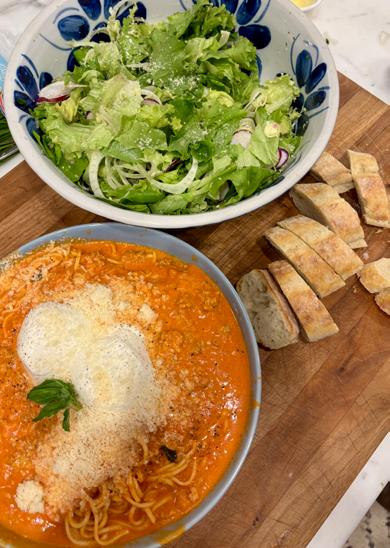
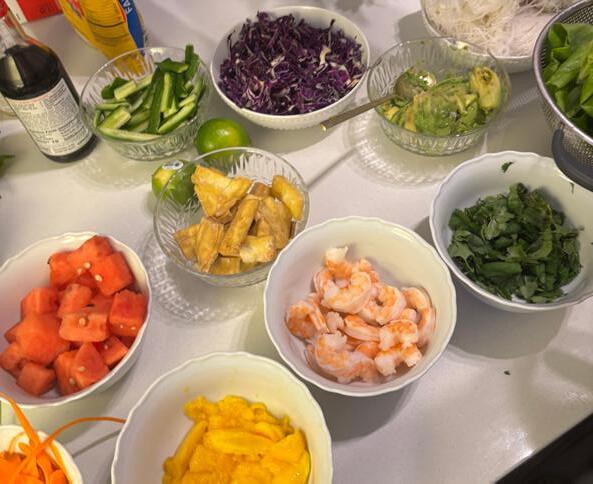
one shelter let her provide meals. Now, she is unable to donate her food to shelters, as they require food to be cooked onsite or in a commercial kitchen.
Despite this roadblock, Kelly won’t let it keep her from giving back. She is still on the lookout for a shelter that will accept meals, and she plans to let her Instagram followers know when the proceeds will be used to fund meals in the future.
“If I’m gonna do a meal for the homeless, I will post like, ‘Hey, this meal is for the homeless,’ to kind of have more people be motivated to buy it for that [and] not just for themselves,” Kelly said. “But I’m still looking for a place to do it.”
Around three times a week, excluding Fridays and Saturdays, Kelly will take orders from Marquette students through her Instagram account. On a typical delivery day, Kelly will receive a total of 15 to 30 orders.
Although her service is open to all Marquette students, it has seen increased popularity among first and, specifically, second-year students because of a residence hall delivery option.
“It’s kind of like the sophomore, Schroeder, Cobeen, Carpenter demographic,” Kelly said.
Originally, Kelly had students fill out their orders on a Google form, stating their desired meal, time and drop-off location. But as customers’ direct messages were lost while scheduling drop-off timing for every order became too hectic, Kelly found herself scrambling to find a better option.
This year, she created a Jotform that students can order their meals from and outlines specific meal dropoff times for the different
residence halls, allowing her to devote more of her time and energy to the food instead of managing operations.
But Kelly’s day still requires a lot of meticulous planning.
A typical order day for Kelly begins at around noon. After scouring Pinterest for inspiration for the day’s menu and posting it, she then purchases the necessary groceries for that day’s meals.
From 5:30 p.m. to 8 p.m., Kelly can be found laser-focused in the kitchen as she freshly cooks every meal, jumping back and forth between boiling pots and steaming ovens to ensure every meal is perfectly cooked. After the ordering window closes at 6:30 p.m., she begins trekking through campus to deliver the meals and notify people through her Instagram story. Once 8 p.m. rolls around, her hectic day finally comes to a close, and she can unwind and prepare for the cycle to repeat the next day.
Like many first-year students starting college, Kelly was homesick, especially when she ached for family dinners while eating at the dining halls. So, Kelly decided to create that sense of family for herself by cooking “family dinners” for her and her new friends in the Commons’ kitchen, creating a sense of community for her other homesick classmates.
It’s now been three years since she first cooked in the Commons’ kitchen, but Kelly continues to use homecooked meals to connect with her friends and the greater Marquette community.
Despite having many roommates available to assist with cooking her large
menu, Kelly cooks everything she sells completely on her own. But this is a deliberate choice on her part.
“It’s like a tornado when I’m in there,” Kelly said. “When I get it done and people are happy, it makes me feel like, ‘Okay, I can do hard things.'”
Being a college student, Kelly already has existing responsibilities and stressors, whether it be work at Café Benelux or academics. And even though this food service adds another activity to her day, she views it as an opportunity to improve her skills and bring joy to others.
“The only person who’s going to make it stressful is me,” Kelly said. “If I plan well enough and I take my time to be organized and start early enough, it’s not going to be stressful.”
Because of the positive reviews given by her many peers throughout her cooking journey, Kelly finds the value in sharing a good meal, one that goes well beyond just nourishment.
“It’s more about people feeling cared for,” Kelly said. “I just think that food heals, like, on a bad day, if you have a good meal, it can turn your whole day around.”
Despite new challenges and increased demand, Kelly continues to find joy in providing this service. Having one more year left in her nursing program, Kelly is still deciding whether she will continue her business past the 2025-2026 school year. But, for now, she remains committed to making Marquette feel more like home, one meal at a time. To learn more about Kelly’s business, visit her Instagram, @thegirlthatcooksmu.
Bob's Barber Shop serving campus since 1964
Students can get haircuts in Straz Tower location
By Elena Metinidis elena.metinidis@marquette.edu
Walking into Bob’s Barber Shop, chatter buzzed just as loudly as the hair clippers and handheld back massage machines. Since 1964, the family business has served Marquette University students and the Milwaukee community.
In 1993, Bob Krebsbach founded his barber shop, when what’s now the Straz Tower dormitory was a YMCA.
After Krebsbach’s passing on January 22, 2015, his daughter, Christal SanFelippo, took ownership of the family business.
“It will always be Bob’s,” SanFelippo said, while trimming a customer‘s hair out of her dad’s old chair that she now operates from. “This is the only place he ever cut hair.”
SanFelippo hopes to leave the same impact on the shop that her dad did.
In her 30 years of working at Bob’s Barber Shop, SanFe-
lippo has made lasting connections with customers.
“Our customers are family,” she said.
One customer getting his hair cut said he has been faithful to the barber shop since he started attending Marquette in 2002.
“I love the atmosphere, and [Christal] is the only person I let touch my hair,” he said.
Bob’s offers typical barber services, including haircuts and beard trims. SanFelippo said a couple of women come in for a simple trim.
At the end of every haircut, customers get shoulder massages with a handheld barber massager — a fan-favorite.
Employees also pride themselves on the character of the shop.
“It’s how traditional barber shops used to be,” Jake Cohen, a barber who’s worked at the shop for 10 years, said.
“People come to gather.”
Upon first glance, it’s just like any other barber shop.
Each barber has their own station and tools, large mirrors stretch along an entire wall, checkered-like tiles fill the floor and a barber’s pole is fixed by the entrance.
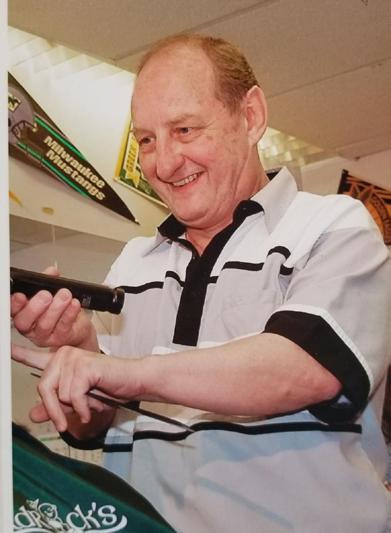
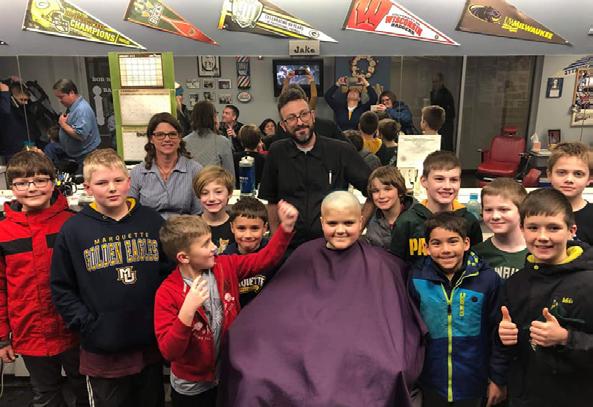
But it’s beyond the cosmetic fixtures of the shop where the story lies.
A photo of an eagle and a Marquette pennant hang high. Newspaper archives and notes from customers praising the service decorate the walls and decades-old photographs of family and customers are framed around the shop.
Some of the photos include Krebsbach, SanFelippo, Cohen and other barbers with the people who have sat in their chairs over the last 61 years.
Whether it’s the former Marquette President Fr. Robert A. Wild, former Marquette men’s basketball player Tyler Kolek, Marquette students, a Milwaukeean or a great-grandson of a customer, everyone will be treated the same, SanFe-
lippo said.
Cohen said the shop has “built-in rotating customers” because students come in for the four years that they are on campus and move back home afterward.
On the other hand, some customers have grown up in Bob’s Barber Shop. SanFelippo has several customers that she met while they were students, who now bring their sons to her chair.
At the end of each day, Cohen said he leaves knowing his customers better than the time before. He enjoys building relationships with them and feels it’s the most distinctive part of the job.
“20-minute appointment, 20-minute conversation,” he said.
The shop relies on wordof-mouth instead of advertisements, partly because
of its old-school nature, and also because, before COVID-19, SanFelippo said, it had more business than it could handle.
“You can’t be walking down the street and find us. You have to know we’re here,” Cohen said.
The shop faced a decline in customers during the pandemic because, SanFelippo said, there were simply less people downtown. Now, the shop is booked back-to-back every day.
SanFelippo, her coworkers and their customers cherish the history and charm of Bob’s Barber Shop and look to continue its legacy for years to come.
“As long as Marquette still has this space in this building, we’re not going anywhere,” SanFelippo said.
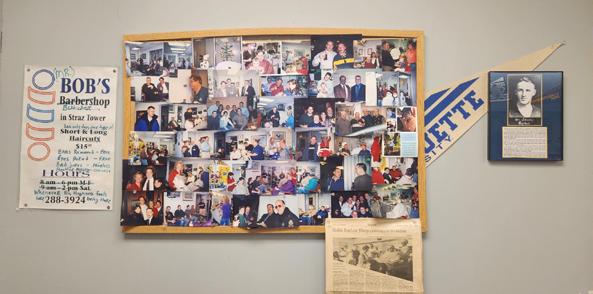
Democrats. A survey conducted by NBC News and NIQ — a New York based marketing firm — found that prices of everyday grocery items such as bread, chicken and orange juice have gone up an average of 14% between November 2024 and November 2025. These continued concerns over the cost of living
come amidst the backdrop of Democrats’ sweeping victories in local elections earlier in November.
Affordability became a major issue in races such as the one for New York City mayor, during which democratic socialist Zohran Mamdani won a decisive victory after vowing to make America’s largest city more affordable
by freezing rents, creating government subsidized grocery stores and making bus transportation free.
Analysts say that this could represent the beginning of a transition towards more “kitchen-table issue politics” by the Democratic party as they seek to redeem themselves after losing the White House and both houses of Con-
gress in 2024. Congressional, SCOTUS approval ratings
The latest poll also found that congressional Democrats and Republicans are facing significantly low approval ratings. 40% of those surveyed approved of Republicans in Congress, with 60% saying they disapprove. The approval of congressional Democrats
was similar, with 36% saying they approve and 64% saying they disapprove. The United States Supreme Court also received net negative approval ratings, with 56% of respondents saying they disapprove of the way the Supreme Court is handling its job, compared to 44% who approve.
The marqueTTe TribuNe
Tuesday, November 25, 2025
NURSING: Millions of students impacted
Continued from page 1
Mitchell made several comments on the plans. Mitchell asked that the implementation of the bill be delayed until July 2027, citing major changes to the financial aid process for millions of graduate students.
In the 2024-2025 academic year, 6.7 million students
used loans to support their graduate education.
“Enrolling in postsecondary education and taking on federal student loans is a major financial decision for students and their families,” Mitchell said. “They deserve to have an ample amount of time to understand the new annual and aggregate
Meals at St. Ben's
Parish provides resources to the homeless in MKE
By Nick Gross nicholas.gross@marquette.edu
On any given night in Milwaukee, dozens of the county’s nearly 900 homeless people sleep unsheltered on the streets. Because people stay in shelters only temporarily, and others move in as some move out, the pointin-time count of 900 means nearly 10,000 local people have experienced homelessness for at least some time during the past year.
As the crisis remains a concern in the city, places like St. Benedict the Moor Chapel at 930 W. State St. help people survive and get back on their feet.
Since opening in 1970, St. Ben’s Community Meal Program has provided hot meals, showers, haircuts, clothing and an address to receive mail for city residents living at or below the poverty line. In addition to everything else, St. Ben’s also helps people obtain birth certificates, which are often essential for people to get a state ID, driver’s license or other documents they need for employment, housing and social services.
According to their ministry statistics in 2024, St. Ben’s helped people obtain 760 birth certificates, provided 8,212 showers, 87 haircuts, 3,562 hygiene bags and 38,796 meals.
The non-profit also helps families celebrate the holidays through their food box drive, which includes Thanksgiving essentials like turkey, gravy and stuffing for over 1,000 households. During Christmastime, St. Ben’s puts together a toy drive which gives children the ability to receive gifts as well.
“It’s made a tremendous impact on the city,” site manager Kenny Howard said. Feeding the hungry and sheltering the homeless are part of the mission of Catholic Social Teaching, Howard said, which is a doctrine focused on human dignity. Giving a hat and coat to someone who really needs them brings them joy as well, he added.
For many community participants, St. Ben’s is more
loan limits to make this major decision.”
Based on institutional feedback, Mitchell recommended that several programs be added to the list of programs, including nursing.
The American Nurses Association fears this legislation will restrict
than a meal stop — it’s a place to find meaning and community.
“They treat you like you’re their family,” Angie Miranda Leon, who receives weekly community meals and help finding housing, said.
Coming to St. Ben’s, she said, has encouraged her to remain strong for her daughter and never give up.
St. Ben’s partners with volunteers from Marquette University’s Midnight Run program, as well as with other community volunteers. Among them, Margaret King, a group leader and Midnight Run coordinator, said she gets more than she gives as a volunteer who puts herself in the shoes of the people she serves.
“It really opens your perspective on life and connects you with the community,” she said.
Another volunteer, community homeless advocate John Tatum, knows firsthand the struggles people coming to St. Ben’s face. Formerly homeless, he said he understands what it’s like to not know where to sleep.
“[St. Ben’s] gave me a place when I was homeless,” he said. “They gave me a place to lay my head; they gave me a place to take a shower and get something to eat.”
The former St. Ben’s beneficiary now works as a site host there, where he helps welcome the guests and assists people with any concerns. He also works security at the Fiserv Forum, where he helps with the Milwaukee Bucks and Marquette Athletics.
Dammond Powell has come to St. Ben’s since he was a child, and he said the agency has always helped his family. The holiday program has a special place in his heart, as it helps families who couldn’t otherwise afford gifts for their kids.
“I’m involved in the Christmas program and Thanksgiving program where they give out a little extra to the ones who might not be able to celebrate those holidays,” he said.
As the community continues to grapple with homelessness, St. Ben’s remains a beacon of hope for some, providing hot meals, showers, hygiene packages and other essential resources that serve members of the Milwaukee community.
access to funding for graduate nursing education, harming the growth of the nursing workforce. They encourage the DOE to further engage with nursing stakeholders and redefine “professional degrees.”
“We urge the Department of Education to recognize nursing as the essential pro-
fession it is and ensure access to loan programs that make advanced nursing education possible,” ANA said in a statement.
The Wire is awaiting responses from Marquette University and the College of Nursing.
PODS: New spaces to nap
Continued from page 1
as an option for commuter students without a place to sleep on campus, Luis de Zengotita, chief wellness officer, said in an email.
Two pods are nestled in the lower level of the Alumni Memorial Union. The remaining pair is in the LOVELLSTRONG Center for Student Well-Being on the Wellness + Helfaer Recreation facility’s third floor.
“They align with the vision that Dr. Lovell and Amy [Lovell] had for offering programs, resources and tools that contribute to holistic well-being,” de Zengotita said in an email.
De Zengotita said Marquette’s wellness program worked with Amy Lovell to improve the LOVELLSTRONG Center after its opening in January. With 40-60% of college students reporting sleep issues, the MetroNaps pods emerged as a candidate for putting donor funds to use.
According to the Mayo Clinic, a 20–30-minute daytime nap can benefit mood and alertness in addition to boosting performance.
“If you did have a latenight studying and you need to catch up on some sleep and rest, you can take a quick power nap and then feel free and energized so that you are a
healthier, happier learner,” Kohler said.
MetroNaps EnergyPods, listed at $13,000 on the company’s website, exist at several college campuses in addition to Marquette’s, from the University of Miami to Washington State University. Professional workplaces such as Google, Samsung and FedEx are also MetroNaps customers.
“Our brains are good at solving problems when we sleep, and people are in a much better position to make important decisions when they’re well-rested,” Christopher Lindholst, MetroNaps co-founder and CEO, said in 2019.
With students working to improve their physical and cognitive health, Kohler said, sleep is especially important on college campuses.
“I think there’s a really good conversation to be had around holistic wellness and just giving yourself a break,” Kohler said. “And if that does include a nap or vegging out for 20 minutes, I think that can bring you back to re-energize yourself so that you can power through the rest of your day.”
While opportunities to rest can benefit students during the approaching finals week, Student Wellness and Health
Promotion hopes students will use them for semesters to come.
“As college students, you’re dealing with a lot,” Kohler said. “Giving yourself space and time to rest is valuable and will ultimately benefit you in the future.”
Suggestions for better sleep
Student Wellness and Health Promotion advises students to take care of themselves by prioritizing sleep on their “to-do lists.” Strategies include:
- Setting a “body clock” and waking up with light, either by letting sunlight into the room or walking around with the lights on
- Getting up at the same time every day to stay on a consistent sleep cycle
- Taking 20–30-minute naps during the day to supplement sleep at night
- Avoiding stimulating activity, such as studying, for 30-60 minutes before bedtime
- Doing light stretching or practicing other relaxation techniques before going to sleep
- Cutting down on alcohol consumption to avoid “shallow” sleep and other disruptions to sleep cycles
- Testing out white noise at night, such as a fan running in the background
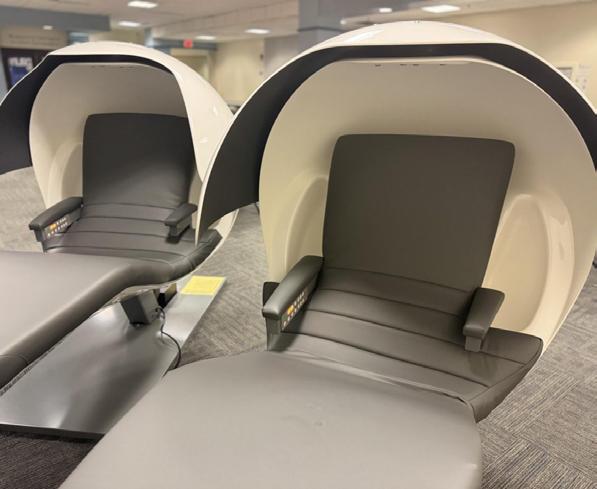
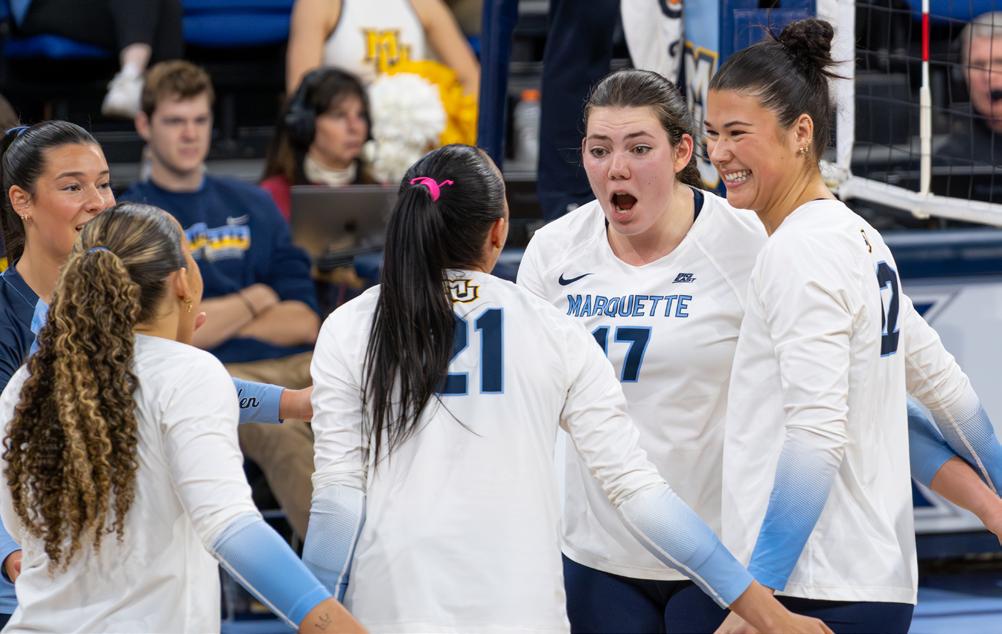
Queuing the music
By Jack Albright jack.albright@marquette.edu
Ava Martin killed many of Marquette volleyball’s things in Saturday’s Big East tournament semifinals. She killed, obviously, the Golden Eagles’ chances at winning, propelling the Bluejays to a 3-0 sweep
See MU-CU page 8
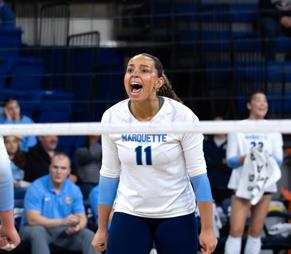
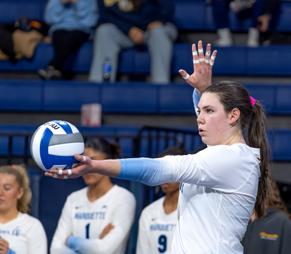
MEN'S BASKETBALL
VB confident it will earn bid to Big Dance
By Jack Albright jack.albright@marquette.edu
All Marquette volleyball can do now is sit and wait. There are no more matches to play, sets to win or kills to swing. Just seven days to brave.
Why this MU fan doesn't buy his own jerseys
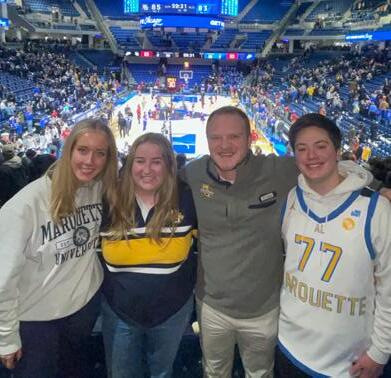
Sam Gutierrez has made six uniforms in last five years
By Ben Ward benjamin.ward@marquette.edu
As one steps into Sam Gutierrez’s Milwaukee apartment, tucked in a small corner in the living room there lies a heat press and a Cricut machine. In his room, four organized cubes of jerseys can be found. One of those cubes houses 15-20 Marquette basketball jerseys that Gutierrez has produced or collected, exhibiting countless colors and designs. One is light
blue with a skyline. Some have retro logos. Some are yellow, others are dark blue. Six are made by him.
Gutierrez, who graduated in 2023, comes from a long line of Marquette alums, including his parents and his mom’s three sisters.
“Growing up, it was always Marquette basketball as the sport to watch,” Gutierrez said.
The creations all started with the untucked jerseys made by Bo Ellis during the 1975-76 season. Gutierrez found inspiration from those revolutionary jerseys to create his own.
He also worked in Marquette’s spirit shop for three years, leading him to be surrounded by mer-
chandise and design ideas which ultimately sparked his motivation to want to create his own designs.
In 2021, he decided to surf the internet for a website that would help him create a throwback jersey that paid homage to the classic untucked jerseys. He came across a website from TikTok, JerseyBird, that created one-off customizations. Gutierrez put his desired design on the website and after two months of shipping, it finally came. But one vital detail was missing. Gutierrez was set on adding the arrowheads on the side of the jersey that represent the old warrior
See FAN page 6
The marqueTTe TribuNe
Tuesday, November 25, 2025
WOMEN'S BASKETBALL
Bringing new vocabulary to Marquette
Consuegra builds program on these seven key phrases
By Mikey Severson michael.severson@marquette.edu
Since Cara Consuegra became Marquette women’s basketball’s head coach in April 2024, she has introduced many terms and acronyms that have become program hallmarks. They are displayed on social media, at games and said by Consuegra herself.
Here are some key words and phrases that are in the glossary:
212 Degrees (noun)
Definition: Water is considered very hot at 211 degrees, but once it heats up one more degree to 212, it boils.
Quote: “[Boiling water] creates steam, which can move a freight train,” Consuegra said after beating Wisconsin 65-62 in overtime on Nov. 8. “And so we talk a lot about, 'What is that one degree? How can we bring that one degree to go from being really good to great?'”
Built for This (phrase)
Definition: When the going gets tough, it is a pact to stay calm by trusting one’s preparation and process.
Quote: “So when we hit a wall where we’re not playing well in the second quarter against Bowling Green, and things were falling apart, ‘We’re built for this,'” Consuegra said.
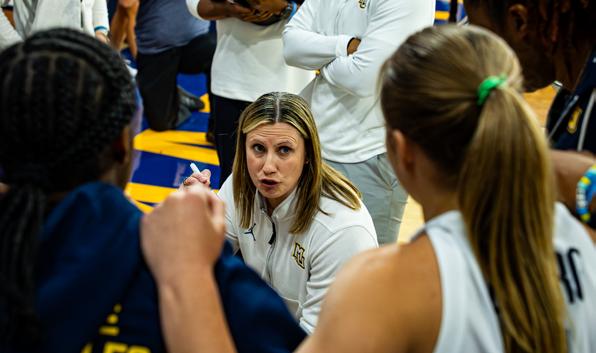
“We’re prepared for this, we know what it feels like to be in adversity and we’re ready to overcome.”
Fun Fact: The phrase exemplified the confidence Marquette needed to make its second-half surge against that Bowling Green team on Nov. 14 — turning a two-point lead at the break, into a 16-point win.
Good! (adjective)
Definition: Seeing adversity as a prime opportunity to learn from and apply its lessons to the next challenge. Quote: “The context behind it is having the mentality that everything that happens to you is good,” Consuegra said. “Because you can take it, learn from it, reload, recalibrate, then go back out there and kick some a—.”
Fun Fact: Originating in the middle of Big East play,
the mantra went full circle last season at the end of the team’s first round WBIT win over Drake, becoming a rallying cry on the sideline. This past August, as Consuegra gave a speech to her team, the saying was emblazoned in gold letters on her shirt.
Hard on Self, Not Down on Self (phrase)
Definition: Balancing the learning that comes with growing as a person and player while also maintaining confidence in one’s ability.
Quote: “You’ve got to be hard on yourself, so you’ve got to be disappointed when we’re not executing at the level we’re supposed to, but we can never be down on ourselves,” Consuegra said after the Nov. 8 game against Wisconsin. “We have to always have confidence.”
MEN'S BASKETBALL
Fun Fact: The phrase was written on the whiteboard in the team’s film room last season to serve as a reminder to help balance the fine line of evaluating critically.
H.E.A.R.T. (noun)
Definition: The team’s five pillars: heart, effort, accountability, respect and toughness. Stated in that order, they form the acronym ‘H.E.A.R.T’.
Fun Fact: When breaking down huddles, Consuegra leads by saying ‘play with,’ then players echo out ‘H.E.A.R.T.’ after each one, whether it be after a game or during a practice.
H.E.A.R.T. has been a staple of Consuegra’s coaching, as she built Charlotte’s program through those same five tenets before coming to MU.
Team Trip: Its values are so entrenched within the
program, that a H.E.A.R.T. retreat/workshop is a summer mainstay.
To the Test: After Consuegra’s first road victory as Marquette’s head coach, against Rutgers in the Battle on the Banks over last year’s Thanksgiving weekend— in which they won the event, H.E.A.R.T. was a springboard for the team’s success.
Leaders are Believers (phrase)
Definition: For one to rise to an occasion, first they must believe in themselves and their teammates.
Examples: Having confidence going up to the free throw line in a crucial spot, finding a teammate on a key inbounds pass.
Quote: “This group wants to be good, and now they’re starting to believe that they’re good, and when you put that all together, that makes us a dangerous team,” Consuegra said after defeating Illinois State, 7857 on Dec. 8, 2024.
Winning Plays (noun)
Definition: The little things within a game that can teeter-totter the seesaw of momentum one way or another.
Examples: Deflections, rebounds, free throws.
Quote: “If we can make the winning plays and rebound, we can separate in this game, we just weren’t able to do it until that moment; that was the difference in the game,” Consuegra said after Marquette beat DePaul, 82-72, on Feb. 15, 2025.
FAN: Alum dons homemade threads at games
Continued from page 5
mascot of Marquette.
So, he went to his sister, who is fluent in arts and crafts, for help. She showed him how to use a Cricut machine (which is used to cut, write and draw on various materials).
With that, the first Sam Gutierrez jersey was created.
A Cricut now still sits in his living room, which he
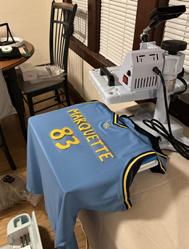
uses to add the arrowheads to his own designs.
After making only two jerseys, his website got shut down as it went through a transitioning period of managing operational and future long-form content, which forced him to pivot to a new way to produce.
Gutierrez soon came up with the idea of buying a blank Jordan jersey from the Nike Team Store to put designs on.
After receiving a Cricut of his own for his birthday in 2025, Gutierrez started to flex his creative muscles, making a jersey for the Big East tournament that incorporated artwork from artist Keith Haring that was displayed in the Haggerty Art Museum at the time.
Gutierrez realized he could step up his game and asked himself to figure out a way to climb even higher.
“I know I can do this. What can I keep doing to level up?” Gutierrez said.
Gutierrez invested in a heat press machine and set up a crafts corner in his apartment dedicated to making jerseys, which helped him produce two over the summer of 2025.
Now, the production process only takes two days.
"What can I keep doing to level up?"
Not 60. It allowed him to make four of his total six uniforms in the last year.
Gutierrez now wants to create new and unique jerseys that are as authentic as possible utilizing his grown skills and advanced machines.
“The goal now is to challenge myself to make two
different jerseys [that] connects to the people, the campus and the city,” Gutierrez said.
In the next five years, Gutierrez would love to think he’s still making
jerseys, but maybe for his own kids. He hopes to stay loyal to the Marquette community and be a part of determining what it means to be a Golden Eagle.
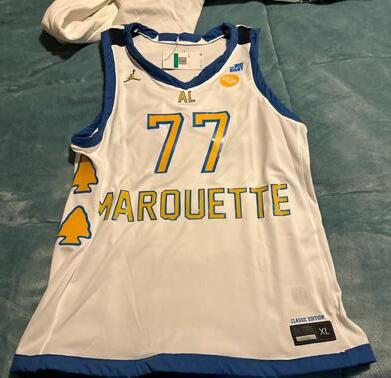
MEN'S BASKETBALL CLUB SPORTS
No portal regrets for Shaka Smart
MU coach stood by taking zero transfers this year
By Jack Albright jack.albright@marquette.edu
Marquette men’s basketball losses this year mean more than an increase in the latter number on its season record. They mean more than a sad locker room, an angry or disappointed coach, disengaged fans or anything else other college hoops teams deal with after defeats.
While the Golden Eagles experience all of those each time their opponents get the better of them — most recently Wednesday night against Dayton — their losses come with more, unique baggage: being one of the few programs in the sport to spurn the NCAA transfer portal.
It leads to questions about the viability of head coach Shaka Smart’s growfrom-within methods. Talk of whether or not that kind of roster construction is sustainable. And, most of all, opinions about if Smart made a mistake this offseason choosing again to build from within and bet on his younger players, something many of his colleagues stopped doing years ago.
Now, with Marquette 3-3, back-to-back home losses for the first time since his first year in Milwaukee and an NCAA tournament berth looking less likely after every game, his choice is an even bigger talking point. And it will only become more prevalent if the season continues on this path.
Smart answered for his anti-portal process after
the 77-71 overtime loss to the Flyers.
“Listen, we’ve had a lot of success around here the way we’ve gone about things. It’s not new,” he said. “What is a little bit different right now is that we’ve had, in the last couple years, six guys exit our program that — before you even talk about them as basketball players — who they were in terms of teammates and leaders and culture-builders, we’re responding to that. We’re having to react and grow from that.
“So, absolutely, we could have gone and recruited someone that was older. Maybe have had more experience. And absolutely it’s really easy to practice resulting right now. But, honestly, when the ball is up in the air and we’re playing basketball that’s not really winning or losing anyone games. It’s about how connected are you as a team.”
Given all he needed to replace this season, a lot of people expected Smart to dip into the portal. He did not. And while the start of the season has been far from ideal for his Golden Eagles, Smart did not question his ways, or display any regret for not portaling.
“We certainly have a group of guys that can win a game like tonight, whether we went in the transfer portal or not,”
Smart continued.
“I’ve been doing this a long time. Criticism comes with the territory. But if you look at the way our process has gone, in the time that we’ve been here, I guess you could still criticize us now, but I think it’s been pretty good.”
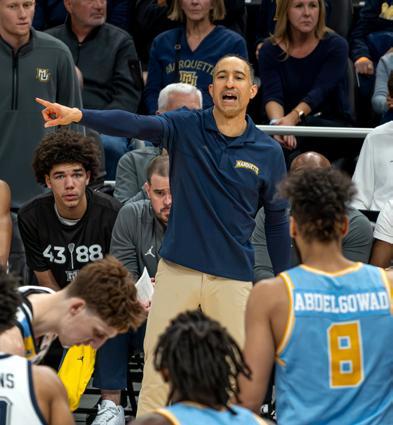
On the mat, in the moment

MU club jiu-jitzu scrimmages local Milwaukee gyms
By Conor McPherson conor.mcpherson@marquette.edu
Humphrey Hall has a reputation for housing Marquette’s top athletes, but tucked deep inside its winding hallways is a room most students never see, almost acting as a secret fight club.
Four nights a week, the university’s Brazilian jiu-jitsu club rolls out black mats and transforms that space into a training ground, where they learn the art of jiu-jitsu, a unique martial art that focuses on grappling and leverage. It originated from Japanese samurai traditions and was later developed in Brazil into both a form of self-defense and a competitive sport.
The club practices every Sunday from 2-3:30 p.m. and on Monday, Tuesday and Thursday from 7:309:30 p.m. Coach Chris Martin, a 2001 Marquette graduate, is usually the first to arrive and has had no shortage of experience to bring to the students in the club.
“I started doing Brazilian jiu-jitsu back in 2008, and I’ve been teaching beginners since 2010,” Martin said. “When I came back to Marquette in 2017, I wanted to build a program that made this sport accessible to everyone, not just experienced athletes.”
Jiu-jitsu is a sport that relies on practice above all else. Students can come in with no experience, roll on the mat with black belts, and [they] always learn — something that many other sports can’t offer.
“What’s unique about this club is that everybody who starts is a beginner.
Most people who come in don’t have experience, so they’re able to learn together,” Martin said. “The learning curve is a lot faster here because students are learning things together and helping each other improve.”
One student who began jiu-jitsu at Marquette is club president Ian Hansen. “I had wrestled a few years, and some friends kept pushing me to try it,” Hansen, a junior in the College of Health Sciences, said. “At first, I went inconsistently. But once I found out Marquette had a club, it was really accessible, and that’s when I started spending a lot more time on the mats.”
Through Martin’s connections, including the Nova gyms in the Milwaukee area he founded, Marquette students get the unique experience to scrimmage other gyms and learn from practitioners outside the program.
“We do scrimmages a lot of the time with some of the local MMA gyms and schools,” Martin said. “Everybody supports the Marquette program because they want the students to continue training and improve, even after they graduate.”
Partly thanks to the UFC, its new promotion UFC BJJ (Brazilian Jiu-Jitsu) and other grappling competitions, jiu-jitsu has skyrocketed in popularity among young people.
Popular UFC fighters like Khabib Nurmagomedov, Charles Oliveira and Islam Makhachev have utilized BJJ to become champions and inspire millions around the world. Jiu-jitsu is now the fastest-growing martial art, with an estimated six million practitioners worldwide according to the UFC.
But its growth isn’t just
due to physical benefits. Training in jiu-jitsu is also considered highly beneficial for mental health, especially for busy Marquette students.
“Sometimes you’re going to feel too tired to come to training, but don’t look at it just as exercise, think about it for your mental health,” Martin said.
“When you leave, you feel so much better, and it also gives you a social outlet to meet friends and be part of a supportive group.”
Martin points to the COVID-19 lockdown as a time when many kids were stuck isolated, and he says BJJ quickly gained popularity afterward due to the healthy connections it offered.
“The real reason I believe that trend is because they were the COVID-19 generation,” Martin said.
“When the shutdowns happened, people couldn’t really watch sports, but the two sports that were on were either wrestling or jiu-jitsu. Kids were home, and they were exposed to jiu-jitsu more because of that than when I started a long time ago.”
The current Marquette student body experienced COVID-19 lockdowns during high school and middle school, formative years for socializing and stepping out of their comfort zones. Jiu-jitsu offers a healthy and engaging way for students to meet lifelong friends and develop a valuable skill.
“It’s really fun to watch people progress and truly be interested in the sport,” Hansen said. “It makes me really happy when I see tons of people still coming in months into the semester, spending two hours with us that they don’t have to spend.”
VOLLEYBALL
MUSIC: MU learns fate Sunday
Continued from page 5
The Golden Eagles lost their final chance to guarantee an NCAA tournament bid on Saturday, falling in three sets to top-seeded Creighton in the Big East tournament semifinals. The sweep means Marquette, which rests near the bubble at 33rd in the RPI after a season chock-full of both bid-clinching wins and bid-losing defeats, left its fates in the hands of the selection committee.
Losing to the Bluejays will not hurt the Golden Eagles’ resume — Creighton is No. 12 in the AVCA coaches poll and 6th in RPI — but a win would have sealed their hopes and started a dance party. Regardless, head coach Tom Mendoza is confident of Marquette’s chances.
“We’re solidly in the position that we’re in. We were playing tonight like we wanted to either improve or solidify our seeding,” Mendoza said after the Creighton game. “Or get another top 25 or 50 win. Or, honestly, just win the Big East tournament.
“So I think we’re in a
good place, and hopefully we’ll learn from this experience.”
As self-assured as he may be, the fact remains the Golden Eagles have to endure a week of waiting before the NCAA tournament selection show next Sunday, Nov. 30, to know for sure. It’s a unique spot for the blue & gold to be in, for multiple reasons.
Normally, Marquette has to wait only hours to find out if they would be dancing. But this year, because the Big East tournament was a week sooner than normal, that timeline was extended to seven entire days.
“It’s definitely interesting, because we haven’t had this experience before,” senior outside hitter Natalie Ring said. “We’ve always had the conference tournament right before the selection show, so it’ll be definitely different to have a week to wait.”
The longer wait is not the only difference, though. Marquette has seldom found itself this close to the edge of making it in the past decade.
But after damaging road
losses at Georgetown — which was No. 148 in the RPI at the time of the game, and currently sits 129th — and Villanova, coupled with a home five set defeat to Ball State, the Golden Eagles finished the season 17-10 and 11-5 in Big East play.
"We got to go into it expecting to be in the NCAA tournament and preparing that way."
Natalie Ring Marquette volleyball outside hitter
Because of these blemishes, Marquette’s NCAA chances rely on its noteworthy sweeps over thenNo. 15 Florida and Western Kentucky (No. 30 in the RPI), and its highest-RPI
victory over Xavier at the end of the regular season. It also works in the Golden Eagles favor they dropped only frame across their last four matches before the Big East tournament — to the Musketeers — and looked to be playing their best volleyball when it mattered most.
“We’ve played a tough schedule, and we’ve gotten some wins against good teams,” Ring said. “We’ve had some top 25 we had some top 50 wins. We’ve put up good showings against top 10 teams like Creighton, so I think we’ve shown [we deserve to make it]. Hopefully the committee can agree with us, but we’ll see next week.”
Despite Marquette’s fickle play, ESPN women’s volleyball bracketologist Charlie Creme has it in the tournament. The Golden Eagles are approaching this week preparing as such, while the rest of the volleyball world’s dust gets settled.
“We got to go into it expecting to be in the NCAA tournament and preparing that way,” Ring said. “And just hope that the committee agrees with us.”
MU-CU: Martin sparks Bluejays' win
Continued from page 5 (25-19, 28-26, 25-23). She also killed any of their hopes of hoisting the conference championship trophy for the second time in program history.
And, if that were not enough, the Big East player of the year very well could have killed Marquette’s 2025 NCAA tournament appearance — and season.
The Golden Eagles, who are No. 33 in the RPI, went into Saturday’s game epitomizing “bubble team.” A win over the No. 12 ranked Bluejays, would have burst that and started a dance party.
Martin had other plans,
though. Plans that nobody on Marquette could overcome, no matter how many times they dove to keep a point alive or swung with the intention of ending one. Twenty-four kills on .432 hitting plans.
“It was a combination of her playing well and also our block could have been better,” Marquette head coach Tom Mendoza said.
In the first set, Martin posted eight kills — double the number of leading Golden Eagle Natalie Ring’s four. She also did it with a .667 hitting percentage, while Ring was even at .000. By the end of the second
frame, Martin had 19 kills on .500 hitting. But it was when the last of the 11 in the set came that was most important.
All three times the Golden Eagles had a chance at closing the set — first at 24-23, then again 25-24 and one more time at 26-25 — Martin came aswingin’ and ended Marquette’s chances with kills of her own. By then, it was too late for Marquette to win, no matter how much it fought, and Creighton secured the sweep.
“Losing multiple deuce sets is always frustrating, because you think you’re so close, or had set points
and didn’t capitalize,” Mendoza said.
The Golden Eagles were led by Ring, who finished with 13 kills, the lone player to post double-digit numbers in that stat.
Now, Marquette has a long week of thumb twiddling as the rest of the volleyball world plays before learning if Martin did enough to end its season.
“We have put together a resume that deserves to be in the NCAA tournament,” Ring said. “I think we’ve played a tough schedule, and we’ve gotten some wins against good teams.”
Bray goes pro
Middle blocker picked No. 25 by Rise in MLV draft
By Jack Albright jack.albright@marquette.edu
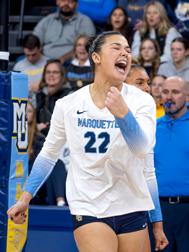
Bray made Marquette volleyball history. The graduate student middle blocker became the first Golden Eagle to ever be drafted into Major League Volleyball on Monday. Bray was selected No. 25 overall by the Grand Rapids Rise in the fourth round of the 2025 draft.
Bray is the third player in Marquette history to earn four-straight All-Big East selections. In her final collegiate season, she led the conference with 1.22 blocks per set and ranked fourth in hitting percentage at .373, finishing the regular season with 118 total blocks.
The Hancock, Wis. native joins former Marquette middle blocker Jenna Rosenthal in the MLV. Rosenthal recently signed with the Omaha Supernovas after spending the past two seasons with the Columbus Fury (2024) and Atlanta Vibe (2025).
Bray also reunites with former teammate Jenna Reitsma, who was recently announced as the Rise’s new director of volleyball operations.


Fun & Games
Peanuts Characters
Peanuts Characters
Brown
12 of 12 words placed.
Thanksgiving
4. Grows on a cob.
5. A side dish that is also a gerund.
6. Gobble gobble.
7. Sweet, fluffy bread.
8. Savory, brown sauce.
10. Pasta and dairy.
11. Dessert made with the fruit that poisoned Snow White.
1. Type of gelatinous red sauce. 2. Blended starch vegetable.
3. Dessert made from a gourd. 4. Green bean ____ 9. Sweet potato adjacent.
Opinions
Black Friday promotes overconsumption

By Amelia Lerret amelia.lerret@marquette.edu
Promoting the overconsumption of products through crafty marketing tactics results in harmful impacts on the environment and individuals.
Strategically placed to start the holiday season, Black Friday is celebrated by both companies and consumers. It is one of the most important days of the year for businesses because it consistently brings in masses of customers. According to Walden University, 169 million shoppers participated in either in-person or online shopping on Black Friday in 2024. Started in the 1960s, the
idea of the holiday is that companies give drastic discounts on their items, and consumers buy more for less. While it poses an opportunity for people to acquire necessary items at a lower price, it is risky when they purchase things for no reason, as online shoppers spent $10.8 billion on sales in 2024, according to NPR.
On Black Friday, overconsumption is displayed as shoppers race through malls with loads of bags on their arms, striving to get as much as they can. With the use of sales and marketing tactics, it is easy for people to fall victim to buying things they didn’t need or didn’t come for.
An effective marketing tactic is flash sales, which communicate urgency — reducing time for consumers to think rationally — and promote impulsive decisions.
Flash sales allow companies to take advantage of the concept of loss aversion, which claims people feel the pain of a loss greater than the joy of a gain. By giving time constraints on purchases, stores pressure customers into making quick decisions, assuming they will fear missing a great deal.
Stores also exaggerate discounts on their items, making people believe they are saving more money than they are. This is shown by signs that have the original price in small lettering with descriptive words about the deal taking up most of the space.
The music that stores play on Black Friday is not a coincidence, either; rather, it is used to a company’s advantage. Christmas songs invoke feelings of nostalgia, and calming sounds help
relax customers to spend more money.
Tallahassee Memorial Healthcare reported that music can relieve stress and match one’s mood to the songs’ energy. So, the use of calming and nostalgic music in stores recharges customers amid a chaotic day, encouraging them to feel comfortable to spend more money.
Marketing tactics convince shoppers to buy in excess, furthering the consequences of immoderate spending.
Overconsumption is an ongoing issue that will have detrimental impacts on society. Environmentally, it can lead to long-term effects of climate change from the release of hot gases into the atmosphere, pollution from factories and habitat loss for agriculture and infrastructure, which is a primary factor in animal extinction, according to the Sustainability Directory.
Alongside broader impacts, individuals pay the price as well. The prioritization of material items
over social connections can encourage isolation, influencing one’s relationships and community.
To combat wastefulness, people can participate in the movement of Green Friday, which encourages customers to buy from eco-friendly businesses or none at all. It promotes mindful consumption amid a society immersed in excessive spending.
However, Black Friday is not harmful in every aspect; it poses key opportunities for people to save money on things they want or need. It becomes a problem when customers fall for advertising that results in purchasing cheap, unnecessary items.
So, this Black Friday, fight against the marketing tactics and make sound decisions about purchases. The impacts of overconsumption are not worth the extra items in your cart.
Fan behavior is getting out of control
By Rachel Lopera rachel.lopera@marquette.edu
Obsessive fans are blurring the lines of their relationships with celebrities, putting individuals at risk of harm.
Many people have parasocial relationships — one-sided emotional bonds — with celebrities, public figures or fictional characters. These personal connections can develop through different media forms such as music, television and social media.
However, it becomes concerning when these relationships turn into obsessive fan behavior — an unhealthy fixation with a public figure or character. It can lead to negative psychological effects which can result in physical actions.
During the “Wicked: For Good” premiere in Singapore on Nov. 13, a man was caught on video running toward Ariana Grande, who plays Glinda in the film. The perpetrator, 26-yearold Australian Johnson Wen, was seen jumping the barriers blocking the red carpet and grabbing Grande’s shoulders.
The video shows Grande’s co-star, Cynthia Erivo, prying Wen off and then security escorting him out. Police arrested Wen the next day and charged him with public nuisance. He plead guilty and has been sentenced to nine days in prison.
Aggressive behavior towards anyone is terrifying because people may have their own mental health issues that we are unaware of.
People have accused Wen of re-traumatizing Grande, considering her experience with post-traumatic stress disorder after a suicide bomb attack at her 2017 Manchester concert.
It demonstrates how we do not know what someone has been through or what is happening beneath their public façade.
Wen’s unusual behavior is even more frightening as he has a history of disrupting events and accosting celebrities, earning him the name of “serial intruder.” The Singapore episode revealed his identity, which was linked to previous celebrity-fan incidents.
Wen jumped onstage at Katy Perry’s Sydney concert in June 2025 and did the same at a concert for The Weeknd in October 2024.
Something more disturbing is that Wen has posted videos of these altercations on social media at his own accord. His Instagram page is full of videos of himself crashing concerts and sports events. Even the comment sections under his posts are calling Wen’s actions “traumatizing” and forms of “assault.”
These escalated paraso-

Extreme parasocial relationships can go beyond stage invasion.
cial relationships can be unnerving for celebrities, but they can also have negative impacts on the fans experiencing the one-sided connection. Growing attached to a celebrity or character can contribute to isolation and increase the risk of chronic health problems such as depression or anxiety. It becomes dangerous when those internal emotions transfer to potential physical harm like in Wen’s cases.
However, it does not stop at just stage invasions. There have been several cases of obsessive fan behavior that can vary from threatening fan mail to alarming stalking incidents.
During a 92NY interview event in August 2023 with singer Reneé Rapp, Drew Barrymore had an unexpected encounter with an alleged stalker.
The offender, Chad Busto, shouted Barrymore’s name from the audience
and quickly approached the stage. Barrymore looked frozen in fear as he said, “I’m Chad Michael Busto, you know who I am. I need to see you at some point while I’m here in New York.”
Luckily, security officers jumped into action and Rapp swiftly escorted Barrymore off the stage. Instances like these emphasize the importance of self-control. It can be difficult to remember that celebrities are real people, but the actions of crazed fans have real consequences. Famous people have a livelihood that does not revolve around their thousands of fans’ parasocial relationships. When admiration turns into invasion, people are no longer fans; they are frightening fanatics.
Statement of Opinion Policy
The opinions expressed on the Opinions page reflect the opinions of the Opinions staff. The editorials do not represent the opinions of Marquette University nor its administrators, but those of the editorial board.
The Marquette Tribune prints guest submissions at its discretion. The Tribune strives to give all sides of an issue an equal voice over the course of a reasonable time period. An author’s contribution will not be published more than once in a fourweek period. Submissions with obvious relevance to the Marquette community will be given priority consideration.
Full Opinions submissions should be limited to 600 words. Letters to the editor should be between 150 to 300 words. The Tribune reserves the right to edit submissions for length and content.
Please e-mail submissions to: rachel.lopera@marquette. edu. If you are a current student, include the college in which you are enrolled and your year in school. If not, please note any affliations to Marquette or your current city of residence.
Americans need SNL's political satire

By Bella Gruber isabella.gruber@marquette.edu
Since 1975, Saturday Night Live (SNL) has presented satirical political skits with one objective for its audience: to make them laugh, no matter their political stance. Under Donald Trump’s leadership, comedic relief is a necessity for Americans in order to escape from the country’s divisive political climate. Among the struggles that our country faces currently, people can put their sorrows aside to enjoy a staple of American television: Laughing at the calamity of the nation’s political climate. SNL’s large platform takes advantage of their audience to continuously promote free speech through criticism of the government, as the media is
historically guaranteed.
The show’s history of political satire tracks back to Chevy Chase impersonating President Gerald Ford in its debut season. Since then, cast members have mocked politicians’ flaws to take a lighter approach to politics rather than gloom and doom.
Fast forward 50 years, and Americans are more politically polarized than ever. With 51% of adults relying on social media for political news, people are more inclined to seek distrust in others rather than compromise. Civil political conversations are becoming rarer; they have become an avoided topic rather than a cordial discussion.
Despite this climate, Americans from both sides of the aisle anticipate how
SNL will interpret political events every Saturday night. Iconic impressions of Hillary Clinton by Kate McKinnon or James Austin Johnson’s presentation of President Trump are instances where comedy lightens how television discusses politics.
Beyond the fact that these skits are created for entertainment, the writers and cast members intend to latently signal disapproval of the state of the country, as they recognize the show’s large influence.
SNL’s roasts are often intended to be fictional, tabloid jokes, but recently, they have shifted to revolve around realistic political affairs — the government shutdown, Trump’s involvement in the Epstein files and SNAP benefits being revoked.
During both of Trump’s presidencies, SNL skits have frequently roasted his republican agenda to put his actions into perspective. “Weekend Update” — a weekly news-style segment hosted by Colin Jost and Michael Che — includes digs at the president.
Jost took a stab at Trump’s interaction with a trickor-treater on Nov. 1, asking, “Why is he so weird?” then describing his presidency as “A violation of
norms that no other president or person has ever conceived of.”
These skits also critique Trump’s work as president beyond his actions, sending an underlying message about his character. Johnson’s impression of Trump caricaturizes his body language, ego and logic to indicate the danger that his poor integrity poses to America as a leader.
Compared to news outlets that provide one-sided views of politics, SNL’s portrayal of Trump brings a comedic approach, providing viewers with an understanding of how politics can impact the world around them on a national scale.
Historically, SNL has criticized Trump more than any other president, receiving negative reactions from Republicans on Capitol Hill. White House spokeswoman Abigail Jackson refused to react to SNL’s episode following the suspension of “Jimmy Kimmel Live!,” saying, “I have more entertaining things to do — like watch paint dry.” In 2019, Trump said that he wanted the FCC to investigate the show’s portrayal of him.
The right-wing media has also given harsh backlash to SNL’s skits mocking
Republicans. In response to a “Black Jeopardy” skit featuring Tom Hanks, Fox News scrutinized SNL for being “low, uncouth and disgusting.”
Despite inevitable backlash, SNL persists in using its platform to shift the negative narrative of politics into something that all Americans can laugh at, even with Trump’s dangerous leadership morals.
While political satire cannot control the outcome of elections, these skits can share underlying messages to their viewers to contextualize the state of today’s political climate as something meant to serve the people, not to divide them.
Throughout SNL’s 50 years of giving Americans a laughable attitude towards politics, its skits have become iconic pieces of entertainment that people continuously look forward to, unlike nearly any other political event. Taking advantage of the unity that television provides is needed across the political spectrum to create a lighthearted, relieving pause from the current state of politics.
Trump's FIFA passes misuse resources
By Lexi Childers alexandria.childers@marquette.edu
The World Cup is coming to the United States in June. To accommodate the influx in travel, President Donald Trump has announced an expedited visa program to allow international visitation to those who have purchased World Cup tickets. By doing this, Trump is misusing emergency protocols.
Trump met with the FIFA president, Gianni Infantino, on Nov. 18 to discuss the upcoming World Cup. Over 100 games will be held in various venues across North America and President Trump has vowed to ensure its success within the United States.
This program – dubbed the “FIFA pass” – would allow expedited visa appointments for FIFA ticket holders. To back this extreme influx of applications, Secretary of State Marco Rubio has claimed that hundreds of additional visa counselors have been appointed and dispersed across the country. With this program, up to 80% of the world could receive appointments within 60 days of applying. These expedited appointments are intended for emergency circumstanc-
es, and the Trump administration is actively overcrowding the resources that are intended to save people’s lives.
Currently, there are numerous factors that are considered when approving an expedited process. The ones laid out by the State Department involve the severe financial loss of a company, the instance of urgent humanitarian situations or emergencies, a non-profit entering the nation for the purposes of furthering cultural or social engagement, an error from the Citizenship and Immigration Services or national security interests of the government.
This is going to hurt people currently seeking status. By diverting resources to FIFA ticket holders, it could harm people currently seeking status such as those in need of asylum, who could face internal displacement, poverty and even death.
Even though Trump is attempting to allocate additional resources, it may not be enough, considering there were an estimated 3.4 million people who attended the Qatar World Cup in 2022. This will cost hundreds of hours to follow through on these appointments. If
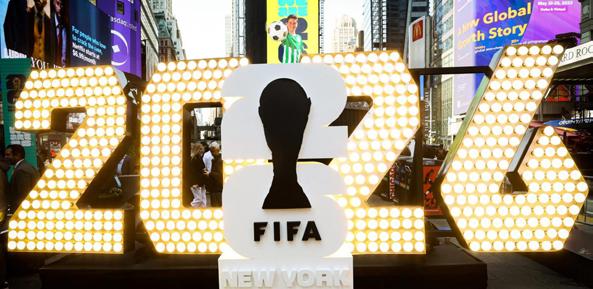
the U.S. has the resources for more temporary immigration and an incentive of tourism and revenue to be this proactive about it, they should allocate resources so permanent immigrants can more easily solidify their stay.
The Trump administration understands that its visa system will struggle with this massive influx of tourists entering the country, which is why they are implementing the FIFA pass. The system needs an immigration reform, but Trump’s rhetoric on this issue will not allow it.
When running for office in 2024, Trump’s principal campaign promise was to
“seal the border and stop the migrant invasion,” which runs all the way back to 2016. By “sealing the border,” Trump’s priority is preventing new immigrants from entering the country.
According to a Marquette University Law School poll, 45% of Americans — specifically Republicans — still approve of Trump’s handling of immigration. In order to ensure that Trump keeps his supporters happy on his primary issue, his hands appear to be tied.
With what Trump has run on and the abysmal approval rating he has, he needs to secure a win for his campaign. With such an extreme stance on im-
migration, Trump has made his own political career shakier.
The bottom line is that giving foreigners with World Cup tickets easier access into the country compared to someone in humanitarian need is disgusting. If we have the resources,President Trump should make some much needed reforms, regardless of what his supporters believe. The president is for the American people, not just one side.
Arts & Entertainment
REVIEW: MU Players Society's 'Fire Exit'
By Annie Goode annie.goode@marquette.edu
The Marquette University Players Society, a student-led theatre organization, put on its first production of the year, “Fire Exit" on Nov. 17 and 18 in Straz Theatre. Originally written by Stacie Lents, this play tackles themes of friendship, guilt and loss, all set in the aftermath of a fire at Westfield High School.
Told in a series of short, mostly humorous monologues, each of the eight characters parses through their emotions after the fire; what they could’ve done differently, who should be held responsible and why something this tragic happened to their community.
The show opens with Principal Evans, played by Jack Del Pizzo, a junior in the College of Arts & Sciences, and seven students sitting in class. Each student falls into the stereotypical archetypes found in most media about high school: the nerd, the jock and the class clown.
Though using archetypes like this can work (I love myself some “The
Breakfast Club” or “High School Musical”), I found the use of them here slightly corny. It seemed like the script wasn’t aware of said corniness in the way that other successful portrayals do.
Rudy, played by Josh Zientara, a junior in the Colleges of Arts & Sciences and Communication, introduces himself and his closest friend Jenks, played by Elizabeth “Bets” Draper, a first-year in the Colleges of Education and Communication, to the audience. The two are determined to do whatever they can to get out of class or distract their teacher and even resort to pulling the fire alarm.
One day, however, after the fire alarm is pulled, Rudy is unable to find Jenks. Rudy stays in the building to look for Jenks, son of the fire chief Devin, played by John “JR” Francis, a first-year in the College of Communication. He runs back into the school in an effort to find him, but Jenks doesn’t make it out, resulting in his death. This part of the show was a stark change in tone from the beginning monologues, which felt like there
was a joke, especially from Rudy, every other line. To see the goofy troublemaker running back into a fire in an attempt to save his best friend’s life was certainly jarring.
As the show goes on, each character deals with the death of Jenks differently.
Bobbie, played by Mei Macey, a senior in the College of Health Sciences, who has only missed three total days of school in her life, including the day of the fire, anxiously calculates the survival rate in an attempt to cope with her survivor's guilt. Helen, played by Carrie DeCoster, a firstyear in the College of Arts & Sciences, lists U.S. presidents and her parents’ grocery list to comfort Rudy. Morgan, played by Meghan Brockway, a first-year in the Colleges of Health Sciences and Communication, takes on the role of detective, determined to find the truth about who started the fire.
The only problem with structuring the show in only monologues was that I sometimes felt lost in the story. By not having the characters interact with each other, sometimes telling the story from the
present, and other times from the past, I felt like I only knew what was happening by the time the show was halfway over. But maybe this confusion I felt as an audience member was supposed to reflect the confusion the characters were feeling throughout the plot.
With the small cast of eight, I was unsure of how director Kendall Syslack, a sophomore in the College of Communication, was going to make the audience feel the sense of community that she described the show evokes in her introduction speech.
As each monologue went on, however, I got a better sense of each individual who makes up Westfield High School. I felt the entire community’s effort to make sense of this tragedy. In this story, people who would have never spoken before turned to each other for comfort in this loss. I understood that what these characters needed most in their time of struggle was each other.
While I thoroughly enjoyed every actor’s performance, I was particularly struck by Zientara’s
and Francis’s portrayals of Rudy and Devin. These characters broke my heart, and both actors masterfully portrayed the misplaced responsibility one takes on in the process of grieving someone.
While the set, consisting of eight chairs facing the right side of the stage, stayed the same for most of the play, the lighting, done by Rory Dwyer, a sophomore in the College of Arts & Sciences, was used to bring the audience to different locations throughout the story. As Rudy and Helen approach the fire, the light turns increasingly red, and then completely black when Rudy passes out. This was a compelling tool that I have rarely ever seen used.
“Fire Exit” is a show about how tragedy tears people down but can also bring them together. While each character lives in the world of their own monologues, they are all connected by this loss. The answer to who started the fire and how to come to terms with Jenks’ death are intertwined with a common theme: things are usually more complicated than they appear.
Chef-couple brings Filipino food to MKE
By Joey Schamber joseph.schamber@marquette.edu
On a typical Monday evening, the doors at Birch on Pleasant Street are closed, but on Nov. 5, Chef-couple Katrina and Zach Panoske took over its kitchen, inviting guests for a pop-up modern Filipino tasting menu called “Sinta.”
They have been hosting these dinners since March, but this was their largest event yet. 50 diners received a seven-course prix fixe outlined on menus hand-drawn by Katrina, with cocktails provided by Birch’s team.
Sinta served everything from reengineered versions of traditional dishes, including its adobo cornets made with foie gras mousse, to well-executed classics like their halo-halo made with house-made ube ice cream.
Zach describes the popup restaurant as a “love letter” from him to Katrina, who was born in the Philippines. The restaurant’s name, “Sinta,” is a testament to this, coming from the Tagalog word meaning “loved one.”
“It’s nice to have your significant other showcase your culture through food.
It’s the best feeling in the world,” Katrina said.
Sinta is inspired by the pair’s travels and is the culmination of Zach’s 14 years of learning to cook Filipino food at home for Katrina. She was an international student at the Madison Area Technical College, where they met and received culinary degrees.
The two married in 2013, later moving from Madison to Milwaukee to continue working in kitchens. Katrina helped transition the Intercontinental Hotel to the Saint Kate, where she continues to work as a sous chef, and Zach was the Chef de Cuisine at Bavette La Boucherie in the Third Ward.
While working at Bavette, Zach maintained his fascination with his wife’s culture and cuisine.
“I found little holes in the walls through my career to get Filipino food on the menu for a special or like a one-off event,” Zach said.
Right now, Milwaukee’s only options for Filipino dining are food trucks like Cocina Filipina in Wauwatosa and other pop-ups like Bad English at Love Cafe in Shorewood, so for Zach,
this restaurant was a way to finally bring Filipino food to Milwaukee diners.
For both of them, Sinta has also been a way to exercise their creativity. Not only are their dishes creatively composed, but Katrina puts great effort into the menu illustrations and the art associated with the pop-up.
Unfortunately, Sinta’s initial success hit a roadblock when Zach had a health emergency earlier this year, forcing him to leave Bavette and reschedule multiple of Sinta’s dinners.
The two were also considering brick-and-mortar options at the time, but any chance of opening their own space had to be put on hold until Zach recovered.
Luckily for them, guests waited and the following dinners in October and November sold out, even after they moved from Bavette to Birch, which accommodates more seating.
“I am grateful for all the people who waited to spend time with us… we’re overwhelmed by the kindness of everyone,” Katrina said.
Filipino cuisine has seen
a massive rise in popularity in many major US cities. Chicago’s Kasama, a two-Michelin-starred Filipino cafe, is one of the most popular restaurants in the city, and it is easy to see why.
Filipino cooking, with its Spanish, American and Chinese influences, will likely feel familiar to many American diners.
“I feel like we take all the good flavors from all of the colonizers,” Katrina said.
Sinta is further proving that Milwaukee diners crave Filipino food, and Zach says he does not feel like they have to compromise on flavor to appeal to the masses.
“If we are trying to show Milwaukee Filipino culture and Filipino cuisine, I am not going to hold back on anything,” Zach said.
He also says that even if Sinta moves to its own physical location, he will not stop experimenting with new ways to present classic dishes.
“At the end of the day, I want to blow your mind. I want you to taste all the flavors, but I don’t want this to look like adobo,” Zach said.
Still, he and Katrina see the value in balancing experimentation with tradition, like they do with their Kare–Kare, which is normally a hearty stew. However, at Sinta, Kare–Kare takes the form of braised short ribs served with a bowl of rice and a rich peanut sauce inspired by Katrina’s own home cooking.
Sinta is still in its early stages of development, but with each dinner, Katrina and Zach get closer to perfecting the restaurant’s identity. For right now, they want to continue doing pop-ups and build their circle of chefs, artists and diners excited about Filipino cooking.
“We have created more than a business. It’s a relationship. It’s a community,” Katrina said.
For example, he would continue making dishes like his adobo cornets. Adobo is the national dish of the Philippines and is typically a plate of marinated and braised chicken and rice. Zach’s more closely resembles something from the French Laundry, served with a foie gras mousse and a sweet soy gastrique.
